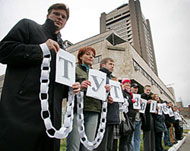Journalists face increasing danger
Journalists in Russia are increasingly the targets of contract-style killings and Iraq remains the most dangerous place for reporters, said a report by the Committee to Protect Journalists.

In its annual Attacks on the Press survey, the journalists group said a total of 56 journalists were killed while on assignment in 2004, making last year the deadliest for journalists in the decade since 1994 when 66 were killed – most of those in Algeria’s war.
Iraq is the most dangerous place to report from, with 23 journalists killed in the line of duty last year and 22 abducted. Most of those killed were local Iraqi reporters.
“To bring us that story, journalists have had to take enormous risks,” CPJ executive director Ann Cooper said as the report was released.
Soviet-style control
The CPJ’s analysis of 15 ex-Soviet republics since the Soviet Union collapsed in 1991 showed strong press freedom traditions were established in only three post-Soviet states, Latvia, Lithuania and Estonia.
In Russia, there had been a purge of independent voices on national television and a suppression of news during dramatic events such as the Beslan school siege last year.
 |
|
Journalists in Russia have been |
“President Vladimir Putin increasingly exerted Soviet-style control over the media,” said the New York-based group.
Alex Lupis, CPJ’s programme coordinator for Europe and Central Asia, said threats to the media came in the form of covert bureaucratic controls, lawsuits, hostile corporate takeovers and aggressive harassment by security services.
Russian authorities consistently tolerated the deaths of journalists in “contract-style” killings such as that of Forbes Russia editor Paul Klebnikov, who was shot and killed as he left work last September. He was the 11th journalist to be murdered in contract-style killings since Putin took power in 1999.
Recent developments in Ukraine offered some hope, but elsewhere in the region the media operated with less freedom than in the closing years of Soviet communism.
Murder
The CPJ said even in a year of war, murder was the biggest cause of work-related deaths, and 36 of the 56 journalists killed on duty were specially targeted for attack.
 |
|
Last year was the deadliest year |
Further cause for concern was the fact that killers of journalists usually were not punished, especially in the Philippines where the murders of 48 journalists had gone unsolved since 1986.
A total of 122 journalists were imprisoned worldwide for their work, slightly fewer than in previous years. The bulk of these came from China with 42 journalists in prison, Cuba with 23 and Eritrea with 17.
“For far too many of our colleagues around the world, facing down repression and violence are simply part of the job of doing journalism,” said Cooper.
American imprisoned
For the first time in three years, the list of jailed journalists included an American. A television reporter in Providence, Rhode Island, Jim Taricani of WJAR-TV, is serving six months of home confinement for refusing to divulge the name of a source, and other cases are pending.
“Taricani’s case along with others still pending in the United States indicate a new willingness to imprison journalists in America, and that sends a disturbing message to governments around the world,” said Cooper.
The CPJ cited some successes in 2004, including the release of journalists in Cuba. Another victory was a ruling by the Inter-American Court of Human Rights which overturned the criminal defamation conviction of a Costa Rican reporter.